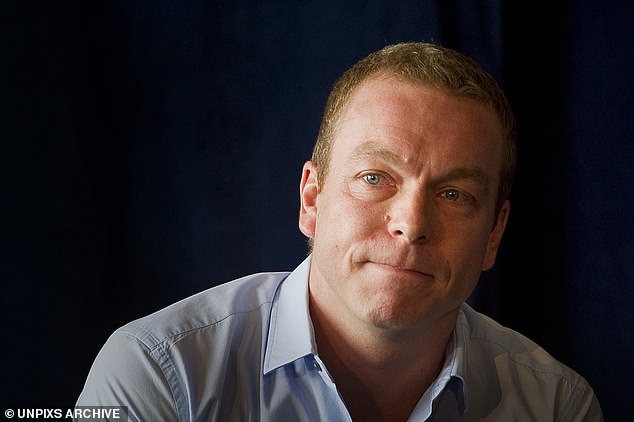Prostate cancer is surging in the middle-aged: Now experts say there’s a simple solution that can save your life. This is what every man needs to know…






When Jack Eckersall found himself unable to get through the night without going to the loo at least four times, he knew something was wrong.
At first he assumed that he was just drinking too much water, but within a few weeks the former chef could barely get through an hour without having to pee.
So finally he sought help from his GP – who spotted something seriously worrying in a blood test. Jack was sent to hospital for a scan and, days later, was diagnosed with advanced prostate cancer. He was just 48.
Now in remission three years later – and getting married next week – Jack, who lives in Bury, feels incredibly lucky to be alive. The majority of men who are diagnosed at this late stage face a far bleaker future.
Last week Olympian Sir Chris Hoy revealed he has terminal prostate cancer, after being diagnosed last year when he was 47. By the time the disease was discovered it had already spread to his shoulder, pelvis, hip, spine and rib. He says he has been given just two to four years to live.

Jack Eckersall was diagnosed with advanced prostate cancer. He was just 48. Three years later, he is now in remission and feels incredibly lucky to be alive
Now more and more experts are calling for all men from as young as 40 to be offered prostate cancer screening tests in a bid to catch the disease early – before it spreads – when a cure is vastly more likely.
Though these checks, known as prostate specific antigen (PSA) tests, are available to men above the age of 50, they have to be requested from a GP.
Prostate cancer is most common in men aged 65 – yet in recent years the number of men being diagnosed in their 50s, 40s and even younger have surged.
Despite this, under-50s are tested only once they show symptoms.
Prostate cancer experts in the UK want this changed.
‘We need to detect men when we can still cure them,’ said London-based prostate surgeon Professor Michael Kirby.
‘Prostate cancer is the most common male cancer, but while we’ve done breast screening for years there’s nothing for men.
‘Men with underlying risk factors, such as ethnicity or family history, need to be tested much earlier, but all men should be screened once they turn 40. It’s a no-brainer – if you know your PSA numbers you will not die of prostate cancer, if you don’t, you might.’
One in eight men in the UK will develop prostate cancer during their lifetime – with more than 56,000 cases diagnosed each year. If the cancer is found before it spreads to other parts of the body, the vast majority of patients live for ten years or more.
But once the cancer has spread – most often to the bones and nearby organs – survival rates drop off a cliff. As it is often asymptomatic in its early stages, many cases are found only when it is already incurable. As a result, 13,000 die from the condition each year in the UK.
Six-time Olympic champion cyclist Sir Chris was diagnosed last September after seeking medical help for a pain in his shoulder – which he thought was a strain. Tragically, his prostate cancer was already at stage four – the most advanced point – with tumours throughout his body.
‘And just like that,’ he writes in his upcoming memoir, All That Matters: My Toughest Race Yet, ‘I learn how I will die.’
Experts say that cases such as Sir Chris’s could be prevented by lowering the age that men are tested.
Unlike other forms of cancer – which can be very difficult to diagnose in their early stages – prostate cancer has a relatively effective screening method.
PSA tests check for high levels of a protein that indicates the prostate is not functioning as it should.

Olympian Sir Chris Hoy’s prostate cancer was found after it caused him shoulder pain. He says he has been given just two to four years to live
A high PSA score is not always a sign of cancer – it can also be triggered by an enlarged prostate, an infection, by sexual activity or even riding a bike.
However, patients with high results are usually sent for scans to identify the cause.
Moreover, PSA tests can be administered cheaply and efficiently, and are available on request to men over the age of 50, when the disease becomes more common. Black men can be offered a PSA test from 45 as they have a higher risk of developing the disease.
But the majority of men under 50 do not have their PSA tested unless they have symptoms. Charities have been advocating for years to have this rule changed – particularly for men with underlying risk factors.
‘We know that men with a family history of prostate cancer, or of ovarian and breast cancer on their mother’s side, have a higher chance of getting prostate cancer,’ explained Prof Kirby.
This was the case for both Jack Eckersall and Sir Chris.
Jack’s father had prostate cancer when he was in his mid-60s, and both Sir Chris’s father and grandfather had the disease. Yet neither was offered PSA testing before they developed symptoms.
Professor Kirby is among a growing group of experts and cancer charities calling for PSA tests from the age of 40.
Although numbers are increasing, prostate cancer before the age of 50 remains relatively rare – just one in 456 men in this age range will develop the disease. But recent research suggests that having a raised PSA in your 40s is as much a risk factor as family history.
‘If the PSA of a man in his 40s is very low, then it’s very unlikely that he will ever get prostate cancer,’ Prof Kirby said. ‘But if his PSA is higher than it should be, he has a 19-fold higher risk of cancer over the next decades.
‘These men, if they know their number, can make sure they have regular PSA tests throughout their 40s – to see if the number keeps rising. If it does, they should have an MRI to check for a tumour. And if it doesn’t, their doctors will have a good idea of what their baseline PSA naturally is.’
Dr Chris Booth, a retired consultant urologist in Colchester and prostate cancer expert, agreed.
‘The NHS wants to diagnose 75 per cent of cancers at stage one and two by 2028, but there’s no way we’re going to meet that without a prostate cancer screening programme,’ he said. ‘At the moment, barely half the men diagnosed have stage one and two prostate cancer – and those are the ones we can cure.

Jack with his fiancee Laura. He believes a targeted screening programme could have found his cancer before it reached an advanced stage

Six-time Olympic champion cyclist Sir Chris was diagnosed last September after seeking medical help for a pain in his shoulder. Tragically, his prostate cancer was already at stage four with tumours throughout his body
‘There’s not enough awareness among younger men that this can affect them too.’
In 2000, Dr Booth co-founded Chaps, a men’s health charity that primarily focuses on prostate cancer. Since 2012 it has offered PSA testing to all men aged 40 and over by hosting pop-up centres across the country.
It has found that 40 to 50-year-olds now make up eight per cent of all those seeking tests.
Chaps screens more than 3,000 men in the UK annually. But working as part of a network of charities that offer PSA tests across Europe, Dr Booth estimates that they will screen almost 80,000 men this year alone.
‘Quite simply, the more people we’re testing at a younger age, the more cancer we’re finding,’ he said. ‘We know that having a PSA above one in your 40s is itself a risk factor – but many men aren’t aware of that.
‘There are lots of people who come to us who can’t get tested by their GP, as well as men with a positive family history who are told to come back if they have symptoms.
‘But if you have symptoms, it’s too late – the cancers we want to catch are silent.’
But expanding PSA testing is not without its critics.
The UK National Screening Committee, which advises the Government on health testing programmes, has previously refused to give the go-ahead for a national prostate programme on the grounds that it could do more harm than good.
The concern is that the PSA test is not accurate enough – around 75 per cent of men with raised levels who are then given a biopsy turn out not to have prostate cancer.
Dr Matthew Hobbs, director of research at Prostate Cancer UK, said: ‘Biopsies can sometimes be carried out unnecessarily, which is a problem because they can be painful and sometimes lead to infections which can, rarely, be life-threatening.’
Detecting cases early doesn’t always change a patient’s life expectancy, some experts say.
However, former bowel cancer surgeon Dr Alasdair Scott, now science director at medical testing company Selph, said: ‘If you think PSA testing is just for diagnosing, you’re not using it correctly.
‘The tests are important as a measure of risk. If you get a high result, you should get an MRI to check for any cancerous tissue and then a biopsy if necessary. The issue is that the NHS doesn’t have enough scanners available for all men over 40 whose tests may come back with a high PSA.
‘But we shouldn’t just be accepting the deficiencies in our healthcare system.’
As for Jack Eckersall, he believes a targeted screening programme could have found his cancer before it reached an advanced stage. Having asked for a test at 40, after his father’s prostate cancer diagnosis, his GP told him he was too young.
After pushing, however, they agreed to do a PSA, which came back high – but not high enough to warrant further screening. In the seven years that followed, Jack’s PSA level sky-rocketed.
‘I wish there had been regular testing when I was in my 40s,’ he said. ‘There needs to be something in place to catch cases like mine, especially where there’s genetic history of prostate cancer. It feels like we’ve been forgotten.’
For now, Jack has other things on his mind – he’s getting married next weekend to his fiancee, Laura.
He added: ‘I was one of the lucky ones, so I can’t stand back and let my stepson, my nephews and other men go through what I’ve been through.’
It’s a fact…
Men whose father or brother have had prostate cancer are twice as likely to develop the disease themselves.
Star saved by an early test
Former Scotland rugby star Kenny Logan discovered his early-stage prostate cancer in 2022 after having his testosterone levels checked at a private men’s health clinic.
Blood tests showed that the then 50-year-old’s testosterone was fine – but his PSA level was high.
After six months of tests, Kenny, pictured with his TV presenter wife Gabby, was diagnosed with prostate cancer – despite still having no symptoms.
‘Ultimately, he had his prostate removed, because that was the best course of treatment for him,’ said Gabby, 51.

Former Scotland rugby star Kenny Logan discovered his early-stage prostate cancer in 2022 after having his testosterone levels checked. Kenny, pictured with his TV presenter wife Gabby
‘Because he caught it so early, it hadn’t spread anywhere. And that’s the danger with prostate cancer. If you wait too long and you have symptoms, it may go to other parts of the body. So he was very lucky.’
The couple, who have been together for more than 22 years, have also spoken candidly about the erectile dysfunction experienced by Kenny after his surgery – something that Cancer Research UK estimates affects 76 per cent of men treated for prostate cancer.
Gabby said: ‘Kenny and I talked frankly about what was going to happen. Erectile function can be massively affected and it might not come back. Kenny was very lucky and it did, but it took a while – his wife wasn’t as patient as she might have been!’




